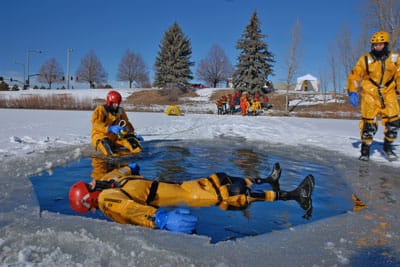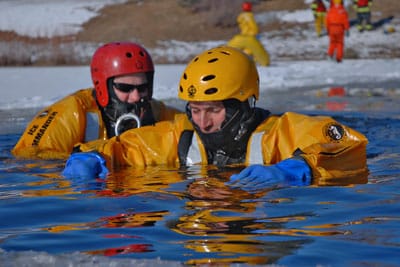Warm temperatures mean thin ice

South Metro Fire Rescue Authority personnel practiced ice rescue techniques in January at a frozen pond on the Meridian golf course.

Information and photos submitted by South Metro Fire Rescue
Icy ponds and lakes are attractions that lead to life-threatening situations almost every winter. If someone falls through the ice, they can succumb to the cold in minutes, so calling 911 right away is critical.
South Metro’s Dive Team coordinator Lt. Dave Becker explains, “We can have trained rescuers wearing proper safety gear to most areas in a matter of minutes. Too many times a bystander tries to help before calling us and they can end up becoming a victim too.” Each spring, as temperatures rise, the problem becomes more acute as ice becomes dangerously thin.
Here is some safety information to be aware of before there is an icy emergency: Remember to reach, throw, and only as a last resort, go.
Try first to “reach” a conscious victim not too far from shore by using a ladder, tree branch or other long item to extend help to the victim. For longer distances, “throw” a rope or hose or some object the victim may be able to grasp. Something that floats, that the victim can hold onto while help arrives, may also work. Only if these options are unavailable or have failed, should you try to “go” to the victim.
Remember that icy water can incapacitate even fit individuals in a matter or minutes, so you truly are taking your life into your hands by attempting an ice rescue without the proper gear or training.
NEVER go near the edge of a hole in the ice to retrieve pets or objects. It is perfectly acceptable to call 9-1-1 for a pet rescue, but endangering your own life without the proper safety gear is too great a risk. Often enough, dogs are able to get themselves out of icy ponds. On more than one occasion, firefighters have ended up rescuing a would-be rescuer after the dog is safely on dry land.
All South Metro Fire Rescue fire engines and trucks are equipped with a “dry suit” which will allow a trained rescuer, who is protected from the cold, to be in the water in a matter of minutes (pictured right). These suits are frequently used to rescue animals, and the people who have gone in after them, from icy ponds.
Visit www.southmetro.org for more information.